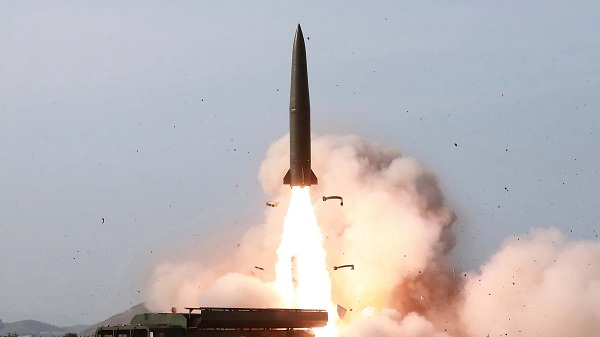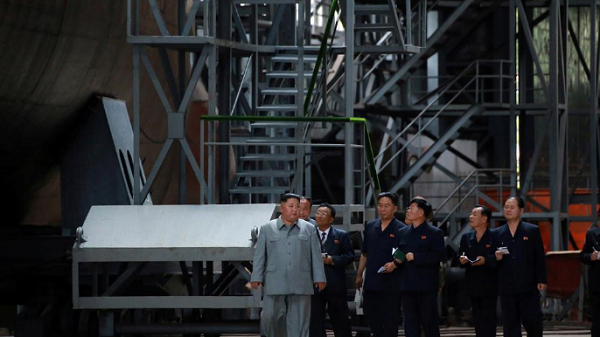Democratic People's Republic of Korea (DPRK) leader Kim Jong Un inspected the demonstration of a "new-type of tactical guided weapon" on Thursday as a warning to the Republic of Korea (ROK) to stop importing high-tech weapons and conducting joint military exercises, state media KCNA said on Friday.

DPRK conducts a "strike drill" for multiple launchers and tactical guided weapon into the Sea of Japan during a military drill in the DPRK, May 4, 2019. (Photos: KCNA)
The DPRK test-fired two new short-range ballistic missiles on Thursday, ROK officials said. It was the first missile test since Kim and U.S. President Donald Trump agreed to revive denuclearization talks last month.
The KCNA report did not mention Trump or the United States, but it said Kim criticized the ROK authorities for carrying on with joint exercises, which are usually conducted with U.S. troops.
"We cannot but develop nonstop super-powerful weapon systems to remove the potential and direct threats to the security of our country that exist in the South," Kim said, according to KCNA.
He accused the ROK of "double dealing" for saying they support peace but simultaneously importing new weapons and conducting military drills, urging that the ROK should stop such "suicidal acts" and "should not make a mistake of ignoring the warning," said Kim.
Kim said he was satisfied with the rapid response and low-altitude trajectory of the weapon, which he said would make it difficult to intercept.
Earlier this week, Kim also inspected a newly constructed submarine, calling for the development of naval armed forces to boost the country's military capabilities, KCNA said.
World reactions
China hopes that the DPRK and the United States can resume talks, Chinese Foreign Ministry spokesperson Hua Chunying said Thursday at a news briefing.
"We hope relevant parties will meet each other halfway and make positive efforts for the political settlement for the denuclearization of the Korean Peninsula," noted Hua.

DPRK leader Kim Jong Un visits a submarine factory in an undisclosed location, in this undated picture released on July 23, 2019.
The U.S. State Department urged Pyongyang to refrain from further provocations and said it still hoped for a resumption of working-level talks on DPRK's denuclearization.
When asked what message the Trump administration was taking from DPRK's launch of short-range missiles, U.S. Secretary of State Mike Pompeo told reporters, "When the president and Chairman Kim were together now just a few weeks back in the DMZ, Chairman Kim made two commitments."
"One, he said he'd commit not to conduct any nuclear tests and that he would continue to avoid launching intermediate-range and long-range ballistic missiles. He also said that he would put his negotiating team back in the game, that we'd have another round of negotiations, and we're working our way towards that."
"North Korea (the DPRK) was engaged in activity before we were having diplomatic conversations far worse than this, more importantly far more dangerous for America and Japan and for South Korea than this. I think this allows the negotiations to go forward. You know, lots of countries posture before they come to the table," said Pompeo.
The ROK side Thursday urged the DPRK to stop acts that are unhelpful for easing military tension, according to the ROK Defense Ministry.
Tokyo regarded Pyongyang's move as "extremely regrettable." "We have confirmed so far that they did not reach our country's territory or exclusive economic zone," Japanese Defense Minister Takeshi Iwaya told reporters.


